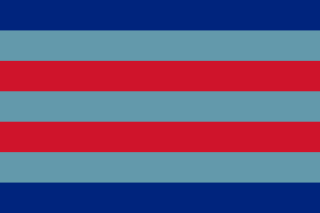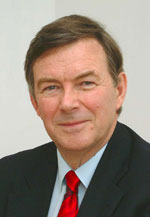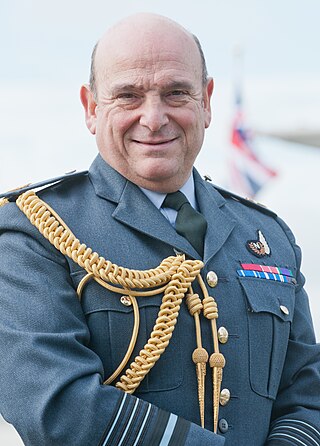
The Royal Air Force (RAF) is the United Kingdom's air and space force. It was formed towards the end of the First World War on 1 April 1918, becoming the first independent air force in the world, by merging the Royal Flying Corps (RFC) and the Royal Naval Air Service (RNAS). Following the Allied victory over the Central Powers in 1918, the RAF emerged as the largest air force in the world at the time. Since its formation, the RAF has played a significant role in British military history. In particular, during the Second World War, the RAF established air superiority over Hermann Göring's Luftwaffe during the Battle of Britain, and led the Allied strategic bombing effort.

Marshal of the Royal Air Force (MRAF) is the highest rank in the Royal Air Force (RAF). In peacetime it was granted to RAF officers in the appointment of Chief of the Defence Staff (CDS), and to retired Chiefs of the Air Staff (CAS), who were promoted to it on their last day of service. While surviving Marshals of the RAF retain the rank for life, the highest rank to which officers on active service are promoted is now air chief marshal. Although general promotions to Marshal of the Royal Air Force have been discontinued since the British defence cuts of the 1990s, further promotions to the rank may still be made in wartime, for members of the Royal Family and certain very senior RAF air officers in peacetime at the discretion of the monarch; all such promotions in peacetime are only honorary, however. In 2012, the then Prince of Wales was promoted to the rank in recognition of his support for his mother, Queen Elizabeth II, in her capacity as head of the armed forces (commander-in-chief), while in 2014 Lord Stirrup, who had served as Chief of the Air Staff and Chief of the Defence Staff for over seven years, was also promoted.

Air chief marshal is a high-ranking air officer originating from the Royal Air Force. The rank is used by air forces of many countries that have historical British influence. An air chief marshal is equivalent to an Admiral in a navy or a full general in an army or other nations' air forces.

The Chief of the Air Staff (CAS) is the professional head of the Royal Air Force and a member of both the Chiefs of Staff Committee and the Air Force Board. The post was created in 1918 with Major General Sir Hugh Trenchard as the first incumbent. The current and 30th Chief of the Air Staff is Air Chief Marshal Sir Richard Knighton, who succeeded Sir Michael Wigston on 2 June 2023.

Air Marshal Sir Richard Williams,, is widely regarded as the "father" of the Royal Australian Air Force (RAAF). He was the first military pilot trained in Australia, and went on to command Australian and British fighter units in World War I. A proponent for air power independent of other branches of the armed services, Williams played a leading role in the establishment of the RAAF and became its first Chief of the Air Staff (CAS) in 1922. He served as CAS for thirteen years over three terms, longer than any other officer.

The Defence Academy of the United Kingdom provides higher education for personnel in the British Armed Forces, Civil Service, other government departments and service personnel from other nations. The Director General of the Defence Academy is Lieutenant General Thomas Copinger-Symes, a senior Army officer.

The United Kingdom's Strategic Command (StratCom), previously known as Joint Forces Command (JFC), manages allocated joint capabilities from the three armed services.

Air Marshal Timothy Garden, Baron Garden,, FRUSI, FCGI was a senior commander in the Royal Air Force (RAF) who later became a university professor and a Liberal Democrat politician.

Joel Hayward is a New Zealand-born British scholar, academic and writer. He has been listed in the 2023 and 2024 editions of The World's 500 Most Influential Muslims. He has been the Dean of the Royal Air Force College Cranwell and is now the Chief Executive of the Cambridge Muslim College in the United Kingdom.

Air Vice Marshal Stanley James (Jimmy) Goble, CBE, DSO, DSC was a senior commander in the Royal Australian Air Force (RAAF). He served three terms as Chief of the Air Staff, alternating with Wing Commander Richard Williams. Goble came to national attention in 1924 when he and fellow RAAF pilot Ivor McIntyre became the first men to circumnavigate Australia by air, journeying 8,450 miles (13,600 km) in a single-engined floatplane.

Air Chief Marshal Sir Alfred Earle, was a senior officer in the Royal Air Force during the Second World War who later served as Vice-Chief of the Defence Staff (1964–66), and Director General of British Defence Intelligence (1966–1968).

Air Chief Marshal Stuart William Peach, Baron Peach, is a British retired senior Royal Air Force officer. After training as a navigator, Peach commanded IX (Bomber) Squadron and then became Deputy Station Commander RAF Bruggen. He was deployed as NATO Air Commander (Forward) in Kosovo in 2000. He went on to be Chief of Defence Intelligence in 2006, Chief of Joint Operations in 2009 and the first Commander of Joint Forces Command in December 2011 before being appointed Vice-Chief of the Defence Staff in May 2013. Peach succeeded General Sir Nick Houghton as Chief of the Defence Staff on 14 July 2016. He succeeded General Petr Pavel as Chairman of the NATO Military Committee on 29 June 2018, serving as such until his retirement from NATO in June 2021.

Philip A. G. Sabin is a British military historian who is currently Professor of Strategic Studies in the War Studies Department of King's College London.
Sebastian Cox OBE, is the Head of the Air Historical Branch (AHB) of the Royal Air Force, a specialist archive and history unit based at RAF Northolt, Middlesex, which seeks to maintain and preserve the historical memory of the RAF and to develop and encourage "an informed understanding of RAF and air power history by providing accurate and timely advice to Ministers, the RAF, other government departments and the general public". He has worked at the AHB since 1984 and been its Head since May 1996.

Air Vice Marshal Michael John Harwood, is a retired senior Royal Air Force officer who served as Defence Attaché and Head of the British Defence Staff – US in Washington, D.C. from 2008 to 2011.
Air Commodore Simon Owen Falla, is a retired senior Royal Air Force officer. He was Deputy Commander and Chief of Staff Joint Helicopter Command from December 2006 until his retirement in June 2010.

The National Defence College, located in New Delhi, is the defence service training institute and highest seat of strategic learning for officers of the Defence Service and the Civil Services. This is a very prestigious course attended only by a few hand-picked defence officers of One-Star rank and civil servants of the rank of Joint secretary to the Government of India. Each year, approximately 25 officers from friendly foreign countries like the US, UK, Canada, France, Germany, Australia, Vietnam, Sri Lanka, Nepal, UAE and others attend the course.
Air Marshal Raymond George (Ray) Funnell, is a retired senior commander of the Royal Australian Air Force (RAAF). He served as Chief of the Air Staff (CAS) from 1987 until 1992. A graduate of RAAF College, he began his career flying CAC Sabre jet fighters in Australia and South East Asia in the 1950s and 1960s. From 1972 to 1975 he commanded No. 6 Squadron, during which time the General Dynamics F-111C swing-wing bomber entered Australian service. He held senior staff posts in the early 1980s. In 1986, he was promoted to air marshal and became the inaugural Vice Chief of the Defence Force. Appointed CAS in July 1987, Funnell was closely involved in the development and dissemination of air power doctrine. He retired from the RAAF in October 1992 following his term as CAS, and was founding Principal of the Australian College of Defence and Strategic Studies from 1994 to 1998. Since then he has served on various Federal Government committees on immigration and detention.

Air Chief Marshal Sir Stephen John Hillier, is a retired senior Royal Air Force officer, who served as Chief of the Air Staff from 2016 to 2019. He was awarded the Distinguished Flying Cross for actions in the Gulf in 1999 and was awarded the United States Bronze Star Medal for service in the Iraq War. He went on to be Air Officer Commanding No. 2 Group, Director Information Superiority at the Ministry of Defence, Deputy Chief of the Defence Staff (Capability) and finally Chief of the Air Staff from July 2016. He was appointed chair of the Civil Aviation Authority in 2020.